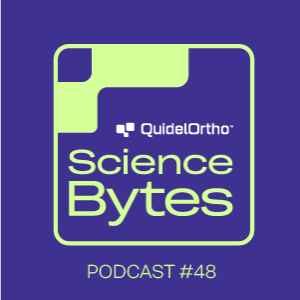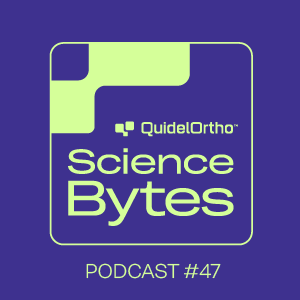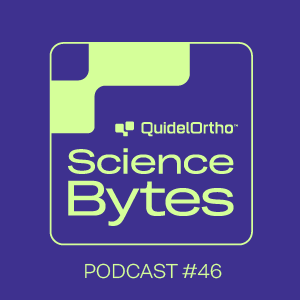
31.7K
Downloads
55
Episodes
Today’s healthcare marketplace is more complex than ever. Labs today are faced with increasing regulatory and quality demands coupled with a shortage of skilled labor. QuidelOrtho is committed to helping labs meet these challenges head-on. Join us every month as we discuss the complex questions labs are facing every day.
Episodes

7 days ago
Blood Donor Awareness
7 days ago
7 days ago
Our 55th episode of QuidelOrtho Science Bytes features Michelle Mullens, Global Portfolio Marketing Manager for Transfusion Medicine, diving into the evolving realities of today’s blood supply, and why steady, year‑round donation is critical to modern healthcare.
From the constant demand driven by everyday trauma to climate‑related disruptions that strain regional inventories, shifting prehospital practices that rely heavily on universal blood types and the growing role of automation in stabilizing testing workflows, this episode explores the interconnected systems that keep patients safe. Mullens shares how donor habits, resilient infrastructure and smarter immunohematology platforms help ensure blood is available when and where it’s needed most.
Sustaining the blood supply isn’t just about meeting demand, it’s about building a resilient, connected system where donors, diagnostics and clinical care work together to protect patients every day.
About Our Speaker:
Michelle Mullens
Global Portfolio Marketing Manager for Transfusion Medicine, QuidelOrtho
Michelle brings invaluable insight to both the science and human impact of blood donation.
Before starting her career on the corporate side, Michelle was a Senior Medical Technologist at Baptist Health, serving in leadership roles for transfusion medicine and immunohematology. Prior to taking on her current role in the global business unit at QuidelOrtho, Michelle served as a technical specialist, business development consultant and clinical science liaison. With significant experience in the blood bank and as a trusted provider to the profession, Michelle brings a unique perspective to the conversation today.

Wednesday Dec 17, 2025
2025 Diagnostic Trends and Innovations
Wednesday Dec 17, 2025
Wednesday Dec 17, 2025
Our 54th episode of QuidelOrtho Science Bytes features Jonathan Siegrist, PhD, Executive Vice President of Research & Development and Chief Technology Officer, exploring the breakthroughs shaping diagnostics in 2025.
From high-sensitivity troponin testing for faster cardiac care to non-invasive assays improving gastrointestinal health, rapid combo tests for respiratory surges and advances in molecular diagnostics, informatics and AI – these innovations are transforming workflows, guiding timely decisions and redefining patient care across the continuum.
Dr. Siegrist shares how cutting-edge research and next-generation platforms are driving smarter diagnostics – delivering fast, reliable insights that empower clinicians and improve outcomes worldwide.
About Our Speaker:
Jonathan Siegrist, PhD
Executive Vice President of Research & Development & Chief Technology Officer at QuidelOrtho
Jonathan is responsible for the company’s global R&D strategy, driving innovation and advancing next-generation diagnostic solutions. He brings over 15 years of leadership experience in the biotechnology and diagnostics industries, with a focus on molecular diagnostics, microfluidic platforms and biomedical engineering. Before joining QuidelOrtho, Jonathan served as Chief Technology Officer and head of assay research and development at Cepheid. Throughout his career, he has been recognized for his ability to lead complex, multidisciplinary teams while fostering a culture of creativity and innovation. Jonathan holds a PhD and Master of Science in biomedical engineering from the University of California, Irvine, and a Bachelor of Science in electrical engineering from the University of California, Los Angeles.

Wednesday Nov 19, 2025
Don’t Wait for the Wake-Up Call
Wednesday Nov 19, 2025
Wednesday Nov 19, 2025
Our 53rd episode of QuidelOrtho Science Bytes features Dr. Qian Ding, MD, PhD, exploring why early detection of diabetes is a clinical and economic imperative.
From identifying silent disease progression to leveraging smarter lab platforms, early testing empowers clinicians to intervene sooner, personalize care and help prevent costly complications.
Dr. Ding shares how diagnostics and emerging biomarkers are helping reshape diabetes care – delivering fast, reliable insights that support proactive treatment and healthier outcomes.
About Our Speaker:
Dr. Qian Ding, MD, PhD
Dr. Ding brings extensive experience in hospital laboratory and in vitro diagnostics with a strong command of healthcare information systems and data analytics. With a comprehensive background in microbiology, immunology, molecular genetics and healthcare business intelligence, Dr. Ding is also an accomplished researcher with an established record of publications in reputable peer-reviewed scientific journals. She's also recognized as a leader at the intersection of science, technology and healthcare.

Wednesday Oct 22, 2025
The Power of informatics in Clinical Decision-Making
Wednesday Oct 22, 2025
Wednesday Oct 22, 2025
Our 52nd episode of QuidelOrtho Science Bytes features George Wierschem, Senior Global Product Manager – informatics, discussing how informatics is transforming clinical labs. From streamlining workflows to strengthening cybersecurity, informatics helps labs turn data into decisions – faster, smarter and more securely.
George shares how modern platforms improve lab efficiency, ensure data integrity and support better patient outcomes through centralized access, automation and accountability.
About Our Speaker:
George Wierschem
Senior Global Product Manager for informatics at QuidelOrtho
George is a trained medical technologist with more than 30 years of laboratory experience. Over the first half of his career, George worked in a number of community-based hospitals progressing from bench technologist into leadership positions. In 2010, George entered the in vitro diagnostics industry, where he's been able to leverage his strong laboratory experience in consulting, product development and product management roles. Currently, George is helping to support legacy QuidelOrtho informatics platforms while also developing several innovative next-generation solutions. George holds an MBA with a healthcare administration specialization and is certified in Lean Six Sigma and change management.

Wednesday Sep 24, 2025
Through the Shades of Illness, Testing Brings Clarity
Wednesday Sep 24, 2025
Wednesday Sep 24, 2025
This episode features Dr. Terry O’Neil, President and Medical Director of Urgent Care Pros, discussing why testing is essential when symptoms overlap during respiratory season. With conditions like strep, flu, RSV and COVID-19 often appearing similar at the outset, timely diagnostics provide clarity for both treatment and prevention.
Dr. O’Neil shares how rapid testing empowers urgent care providers to give patients clear answers, start appropriate treatment quickly, and reduce the risk of spreading illness to vulnerable family members and communities.
About Our Speaker:
Dr. O’Neil is a board-certified ER doctor and the president and medical director of Urgent Care Pros, a group of walk-in clinics providing fast and easy access to quality care. He has over 20 years of emergency room experience and a deep commitment to caring for patients. A graduate of Columbia University, Dr. O’Neil recognized the need for fast, efficient and specialized care in both urgent care and occupational health settings, which led him to establish Urgent Care Pros in January 2020. His approach reflects the mission of Urgent Care Pros, that is to provide unparalleled customer service and specialized health support in an affordable manner, ensuring patients receive the care they need when they need it most. Beyond his clinical work, Dr. O’Neil enjoys traveling, skiing and staying active through fitness, bringing the same energy and commitment to his personal life as he does to caring for his patients.

Wednesday Aug 20, 2025
Staying Vigilant Against Respiratory Illnesses This School Year
Wednesday Aug 20, 2025
Wednesday Aug 20, 2025
Our 50th episode of QuidelOrtho Science Bytes features Dr. Jonathan Temte, a leading public health expert, discussing how schools, families, and healthcare providers can stay ahead of respiratory illnesses this school year. As students return to classrooms, familiar viruses like flu, RSV, and COVID-19 often resurge.
Dr. Temte explains why symptoms alone can’t reliably distinguish between these illnesses and how rapid diagnostics are essential for early detection, accurate treatment, and preventing further spread.
About Our Speaker:
Dr. Temte joined the Department of Family Medicine and Community Health faculty at the University of Wisconsin-Madison in 1993. He is a professor of family medicine and community health and the Associate Dean for Public Health and Community Engagement for the University of Wisconsin School of Medicine and Public Health. Dr. Temte received his BA from Luther College, an MS in Biological Oceanography from Oregon State University, and his PhD in Zoology and Minor in Epidemiology from the University of Wisconsin. He pursued his medical training at the University of Wisconsin Medical School, where he received his MD. Dr. Temte also served as the Director of the Wisconsin Research and Education Network from 2000 to 2005. He chaired the American Academy of Family Physicians Commission on Science in 2008, the AAFP, and he currently chairs the Wisconsin Council on Immunization Practices. He also served as AAFP liaison to the Advisory Committee on Immunization Practices from 2004 to 2008, where he was appointed a voting member from 2008 to 2015 and served as chair from 2012 to 2015. Dr. Temte has also been active on pandemic influenza and bioterrorism working groups for the state of Wisconsin. In addition to his outstanding credentials, Dr. Temte's research interests include respiratory viruses, influenza, COVID-19, schools, and immunization policy.

Wednesday Jul 23, 2025
How Urgent Diagnostic Testing Can Help Prevent Drug Overdose Deaths
Wednesday Jul 23, 2025
Wednesday Jul 23, 2025
In this episode, you'll hear a conversation with our own Vonda McAllister about the critical role of rapid diagnostic testing in helping prevent drug overdose deaths. Discover how early detection in emergency departments enables timely interventions when patients present with altered mental status or respiratory distress. The discussion explores the evolving landscape of substance abuse in 2025, including synthetic opioids like fentanyl, emerging threats like xylazine ("tranq") and the challenges of polydrug use, creating unpredictable and potentially fatal combinations.
About Our Speaker:
Vonda McAllister, Director of Global Product Management. Vonda's diagnostic experience spans from R&D and program management to marketing. Now a member of the Point of Care business unit, she previously managed the Triage™ portfolio of assays and the clinical labs team for North America. Vonda is currently focused on supporting the global regions with our PlGF tests, that is, placental growth factor, and toxicology assays, as well as expanding the Triage toxicology and women's health testing portfolio. She also serves as global leadership co-chair for the QuidelOrtho Women's Leadership Network.

Wednesday Jun 18, 2025
Bloodlines: The Connection Between Blood Donation and Patient Health
Wednesday Jun 18, 2025
Wednesday Jun 18, 2025
In this episode, you'll hear a conversation with transfusion medicine expert Michelle Mullens about how blood donation underpins patient health and the critical role it plays in healthcare. Discover how donated blood is vital not only for trauma care, but also for cancer treatments, chronic illnesses like sickle cell disease, and a wide range of surgeries. The discussion explores the growing challenges of blood supply shortages, the importance of specialized blood types, and how automation in blood banks is helping labs maintain safety and efficiency despite staffing pressures. Learn how each donation makes a difference and why maintaining a robust blood supply is essential for patient care and safety.
About our speaker:
Michelle Mullens
Global Portfolio Marketing Manager for Transfusion Medicine, QuidelOrtho
Before beginning her career on the vendor side with QuidelOrtho, Michelle was a senior medical technologist at Baptist Health, serving in leadership roles in transfusion medicine and immunohematology for nearly 30 years. With QuidelOrtho, Michelle has served as a technical specialist, business development consultant and clinical science liaison before taking on her current role.

Thursday May 22, 2025
Diagnostic Pathways to Women’s Health and Wellness
Thursday May 22, 2025
Thursday May 22, 2025
In this episode, you'll hear a conversation with three women's health experts about how early diagnostic testing is transforming care for heart disease, STIs, and preeclampsia. Discover how proactive screening empowers women, supports personalized care, and helps shift healthcare from reaction to prevention.
About Our Speakers:
Dr. Lindy Crimmins, Global Medical Affairs Manager. Lindy's clinical experience spans from emergency medicine to critical and primary care. Currently, she is responsible for providing medical support for the QuidelOrtho acute care menu throughout the product lifecycle. Lindy is passionate about education, testing guideline updates and assay utilization to drive improved patient-centered outcomes.
Dr. Rea Castro, Director of Medical Affairs. Rea is a seasoned medical professional with extensive experience in pharmaceutical clinical development, biotechnology and diagnostic product development across multiple therapeutic areas, including immunology, oncology and women's health. She is currently a cross-functional leader in medical affairs and is committed to advancing healthcare outcomes through innovative research, quality healthcare delivery and rigorous safety standards.
Vonda McAllister, Director of Global Product Management. Vonda's diagnostic experience spans from R&D and program management to marketing. Now a member of the Point of Care business unit, she previously managed the Triage™ portfolio of assays and the clinical labs team for North America. Vonda is currently focused on supporting the global regions with our PlGF tests, that is, placental growth factor, and toxicology assays, as well as expanding the Triage toxicology and women's health testing portfolio. She also serves as global leadership co-chair for the QuidelOrtho Women's Leadership Network.

Wednesday Apr 23, 2025
Beyond burnout: Key factors and strategies to solve the laboratory staffing crisis
Wednesday Apr 23, 2025
Wednesday Apr 23, 2025
In this episode, we spotlight the essential yet often-overlooked role of medical laboratory technologists – the backbone of today’s healthcare. With 70% of clinical decisions relying on lab results, these professionals face challenges including staffing shortages, rising diagnostic demands, burnout and low compensation. We explore what's driving the crisis and, more importantly, what can be done to solve it.
About Our Speaker:
Katy Marcum
Global Head of Clinical Labs Business Unit
QuidelOrtho
Katy is responsible for leading innovation and commercial success of the business unit worldwide, including strategic direction and solutions development for laboratory diagnostics. In her more than 13 years in the clinical laboratory and invitro diagnostics industry, Katy has served in corporate leadership roles and in the lab with top-tier hospitals, including specimen processing and registration, core lab generalists, and microbiology and serology.
